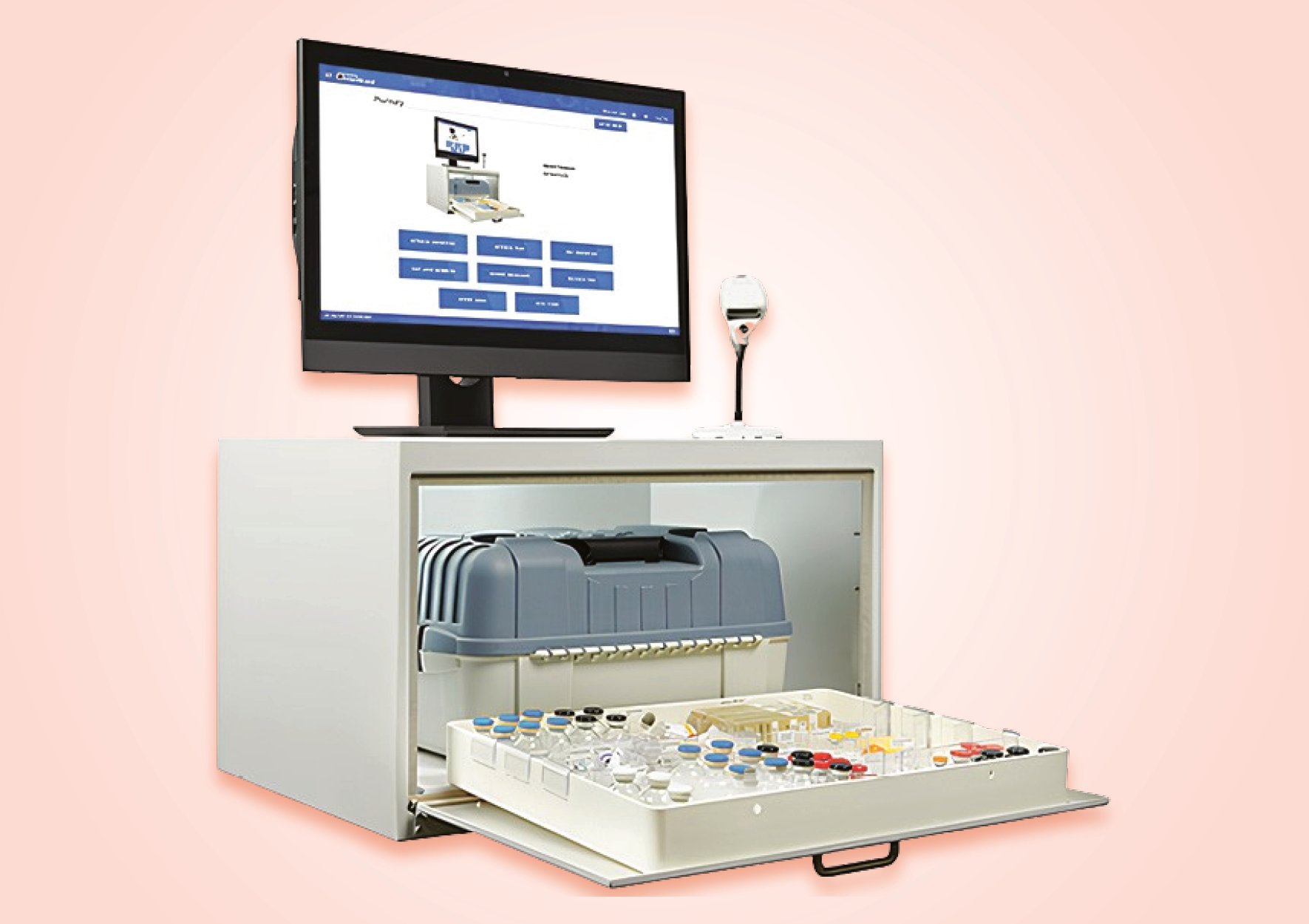- Show Menu
- Contact Us
- FAQs
- Reader Service
- Survey Data
- Survey Winners
- Testimonials
- Upcoming Events
- Webinars
- White Papers
Develop a Strategy for Robust Antimicrobial Stewardship
Implementing a strategy to improve antimicrobial stewardship in health care facilities has become increasingly critical in recent years, as inappropriate anti-infective use has driven high rates of antimicrobial resistance and significant costs related to infections. Up to 50% of anti-infective use in the acute care setting may be inappropriate or unnecessary.1 In addition, antimicrobial stewardship programs (ASPs) must contend with the limited development of innovative anti-infectives in the pharmaceutical industry.
In response, The Joint Commission (TJC) has developed antimicrobial stewardship standards for hospitals, critical access hospitals, and nursing care centers with the goals of reducing inappropriate use of anti-infectives and averting multidrug resistance.2 TJC’s new antimicrobial stewardship standard can be read in its entirety at www.jointcommission.org/assets/1/6/new_antimicrobial_stewardship_standard.pdf. The standard, which went into effect January 1, 2017, has increased focus on compliance, and many hospitals, including Tampa General Hospital (TGH) in Florida, are working to identify ways to improve their ASP efforts. TGH has not only made strides to ensure comprehensive compliance with the standard, but also to increase the quality of overall antimicrobial stewardship to benefit our patients.
Identifying Opportunities for Growth
TGH’s ASP was launched in 2010 with the mission of ensuring optimal antimicrobial care for each patient. Successful program initiatives have progressed from an initial anti-infective cost savings effort to the more recent development of advanced clinical decision support (CDS) strategies to improve patient care. As the program has expanded through the years, the goals of the ASP have remained focused on the following:
- Collaborating with multiple health care disciplines within the institution
- Educating health care team members
- Improving anti-infective dosing and reducing adverse events associated with anti-infectives
- Enhancing CDS strategies and creating ASP-related protocols
- Tracking ASP-related metrics
In anticipation of TJC’s antimicrobial stewardship standards, TGH began preparing prior to the implementation date of January 1, 2017. The ASP team met with hospital administration to assess the strengths of the program and identify opportunities for growth to ensure compliance with the new standards. The opportunities identified included the need for a formal ASP policy and procedure (P&P), and development of education detailing the initiatives of the ASP for the medical staff, as well as patient education focused on antimicrobial stewardship.
The team has moved beyond the standards to focus on fully utilizing IT in antimicrobial stewardship, including optimizing a variety of order sets and anti-infective default order entries, customizing best practice alerts, implementing patient scoring in CDS, creating anti-infective-related EMR reports, ongoing formulary review and optimization, and growing TGH’s fecal microbiota transplant program. In addition, due to the expected expansion of stewardship standards into the ambulatory care setting, the ASP team allied with the ambulatory care pharmacy team to identify opportunities to improve outpatient anti-infective prescribing.
Developing an ASP Policy and Procedure
The ASP team created a formal P&P, which includes an overview of the program and a delineation of the responsibilities of the medical director and the ASP pharmacists. Approved by the P&T committee in October 2016, the ASP P&P was modeled on P&Ps from neighboring institutions and reflect the roles and activities of the ASP team.
Staff and Patient Education
In collaboration with hospital administration, significant time was dedicated to medical and nursing staff education by conducting education groups to identify mechanisms to promote stewardship awareness. The ASP created an online presentation that was incorporated with the annual education for all TGH employees and medical staff, including medical residents. The content of this education highlights the ASP team members, the mission of the program, and promotes the ASP website, which provides a variety of resources to assist in the daily activities of providers, pharmacists, and other health care team members.
The ASP team worked closely with IT staff to create an educational document for patients discharged from the hospital on anti-infective agents. This resource, which is based on the Centers for Disease Control and Prevention (CDC) handout on anti-infectives and viruses,3 is incorporated into the patient discharge summary document. The IT team created a list of the anti-infectives that prompt the distribution of the handout (excluding ophthalmic, otic, and topical anti-infective products). The document is available in both English and Spanish to accommodate various TGH patient populations. The resource is utilized in the main hospital, most of the ambulatory care clinics, and the outpatient center.
Best Practice Alerts
Best practice alerts are employed to alert pharmacy staff about important safety issues, such as the interaction between carbapenem antibiotics and valproic acid products. The available literature notes that patients experience sub-therapeutic levels of valproic acid when on concurrent therapy with a carbapenem antibiotic, which could lead to inadequate seizure control.4 As such, this alert fires to the pharmacist during verification and instructs them to contact the ASP pharmacist to help change the anti-infective or to contact the primary provider to change the anti-epileptic agent.
Another alert was created to notify pharmacists of patients who received vancomycin within the last 6 hours in any area of the hospital, including the emergency department (ED) and the intra-operative setting. The intent of this alert is to reduce duplicate vancomycin therapy, which often occurs as patients transition from the intra-operative setting to the post-operative setting or from the ED to the inpatient setting. Prior to creating this alert, notifications about recently administered vancomycin doses were unavailable, and some patients received vancomycin doses too soon or received duplicate doses. The alert prevents patients from receiving overlapping vancomycin doses, minimizing the risk of toxicity and side effects.
Human immunodeficiency virus (HIV) medication best practice alerts serve to minimize inaccuracies during the order entry process. For example, an alert was built to ensure that HIV formulations containing tenofovir disoproxil fumarate (TDF) are not interchanged with products containing tenofovir alafenamide (TAF). This alert, which fires upon pharmacist verification, requires the pharmacist to confirm that the correct product is being ordered, based upon what the patient had been taking prior to hospital admission.
Patient Scoring in Clinical Decision Support
The ASP is also involved in building patient scoring activities into CDS in the EMR for unit-based pharmacists. Patient scoring is a CDS strategy that prioritizes patient care using predetermined criteria. The criteria for ASP patient scoring include two beta lactams ordered simultaneously, active antibiotic orders with overlapping anaerobic coverage, fluoroquinolone orders active for 10 days or more, and use of restricted anti-infective medications (ie, daptomycin). Unit-based pharmacists interact daily with patients who have been identified through these alerts in the patient scoring view of the EMR. Pharmacists also receive notifications in the following scenarios:
- Patients who have changes in renal function (defined by an increase or decrease in serum creatinine of greater than 0.3 mg/dL) to ensure that medications, including anti-infectives, are appropriately dose-adjusted
- Patients on vancomycin with non-therapeutic levels
- Patients on vancomycin with no levels obtained for ≥5 days
These strategies have been essential to ensure ASP and pharmacy staff members are able to intervene on significant anti-infective issues.
EMR Reports
A number of reports have been built into the EMR to improve the efficiency of the ASP team. Examples of these reports include, but are not limited to:
- Patients prescribed restricted antibiotics (ie, daptomycin, ceftaroline)
- Patients on concurrent vancomycin and piperacillin-tazobactam therapy
- Patients with beta-lactam allergies but on active beta-lactam agents
- Patients with Candida spp. isolated in a respiratory culture with an active order for an antifungal agent
These reports assist in prioritizing patients in need of ASP intervention. The ASP team also utilizes an internal ASP sticky note in the patient’s chart in the EMR to communicate pertinent information and items that require follow-up. ASP pharmacists continue to review daily blood cultures and utilize an electronic template note for patients with Staphylococcus aureus bacteremia or candidemia. The notes provide recommendations and references for the managing team to review and encourage involvement from the Infectious Diseases (ID) department.
Formulary Review and Optimization
Ongoing ASP goals include review of proposed formulary agents and optimization of the order entry process for new and old agents in the EMR. Since 2015, TGH has added the following agents to the restricted formulary list:
- Teflaro (ceftaroline)
- Noxafil (posaconazole) delayed-release tablets
- Avycaz (ceftazidime/avibactam)
- Zerbaxa (ceftolozane/tazobactam)
- Impavido (miltefosine)
The ASP team utilizes alerts to notify providers of restrictions and criteria for use for these drugs. The institution has not added Dalvance (dalbavancin) or Orbactiv (oritavancin), since no defined transition of care to the outpatient infusion center or within the ED has been identified to date.
Expansion of the Fecal
Microbiota Transplant Program
The ASP program has dedicated time to growing its fecal microbiota transplant (FMT) program to aid patients who have exhausted traditional pharmacotherapy options for C. difficile infection (CDI). Since its inception in 2014, FMT has been administered to more than 20 patients, including solid organ transplant patients. To date, the majority of patients have been successfully treated with FMT; one patient required 2 FMTs for successful treatment. Patients who failed FMT were more likely to have received therapeutic antimicrobial therapy prior to FMT.
The ASP also works closely with a hospital task force to prevent CDI. This group requires that prescribers select an indication when prescribing common anti-infectives known to induce CDI, such as fluoroquinolones and ceftriaxone.
The Outpatient Environment
TGH has several ambulatory care clinics with significantly different stewardship challenges from those faced in the inpatient setting. The current ASP focus for the TGH ambulatory clinics is management of upper respiratory tract infections and asymptomatic bacteriuria. The ambulatory care pharmacy team is now collecting data to determine future directions for the ambulatory clinics.
Overcoming Challenges
The ASP has encountered multiple challenges during the implementation and expansion of its services. The involvement of numerous individuals, including hospital administration, medical staff, pharmacy, nursing, and affiliated committees, is required to ensure a successful enterprise. At times, these divergent perspectives may contradict one another. Discussions with multiple disciplines can spark interesting new ideas, which in turn expand the scope and timeline of the project. The effect of this has been that many of the initiatives take extensive time to implement. These experiences have helped the ASP refine their communication skills by keeping discussions focused on the project at hand. At times, larger projects have been split into multiple, smaller projects to facilitate manageable timelines and achievable results.
Competing IT priorities within the pharmacy department can delay the implementation of EMR initiatives undertaken by the ASP. With finite IT resources, this is an understandable limitation that must be factored into the timeline for each project. When patient safety or high-priority issues arise, the IT team fast-tracks this work in order to improve patient care. Being aware of and accommodating IT workflow facilitates implementing changes in the EMR and significantly streamlines the timely work of an ASP.
Recommendations for Success
Each institution must develop an individualized, targeted approach to its ASP team and stewardship-related goals. Priorities for one hospital may differ from another hospital based on prevalent organisms, the needs of the institution, and the available resources. The new antimicrobial stewardship standards from TJC require all hospitals to dedicate focus to antibiotic use; however, how this is implemented will vary among settings. In addition to individualizing the approach to implementing TJC standards, programs should identify a method of tracking relevant ASP data and metrics, providing education to pharmacy and medical staff, and collaborating with IT to accomplish relevant ASP goals. Obtaining administration’s buy-in is critical to moving projects and initiatives forward.
Results and Future Goals
The expansion of the TGH ASP has been extremely rewarding for the team. Involvement with the unit-based pharmacists has increased the reach of ASP interventions. Pharmacists across the institution have helped to improve anti-infective prescribing and incorporation of specific alerts into patient scoring, which has allowed more time for the ASP team to focus on other patient care issues and quality initiatives. Additionally, working with the unit-based pharmacists on anti-infective use has increased their comfort with these agents, allowing them to intervene on antibiotic-related problems with confidence. The ASP has gained continued medical staff buy-in for its efforts to improve patient care, including collaboration to optimize surgical prophylaxis and decrease CDI. We also have successfully integrated regulatory standards, reduced anti-infective costs, and created mechanisms in the EMR to increase patient safety. The program has proven to be sustainable and adaptable to evolving anti-infective issues, including limited anti-infectives and increasing drug resistance.
Moving forward, the TGH ASP will continue to optimize its workflow in the EMR while improving patient care, as well as optimizing surgical prophylaxis, antibiotic desensitization, and antibiotic allergy assessment.
References
- Centers for Disease Control and Prevention. Core Elements of Hospital Antibiotic Stewardship Programs. www.cdc.gov/getsmart/healthcare/implementation/core-elements.html. Accessed September 11, 2017.
- The Joint Commission. Approved: New Antimicrobial Stewardship Standard. TJC Perspectives (July 2016). Volume 36, Issue 7. www.jointcommission.org/assets/1/6/New_Antimicrobial_Stewardship_Standard.pdf. Accessed September 11, 2017.
- Centers for Disease Control and Prevention. Get Smart About Antibiotics. Get Smart: Know When Antibiotics Work in Doctor’s Offices. www.cdc.gov/getsmart/community/materials-references/print-materials/everyone/virus-bacteria-chart.html. Accessed September 11, 2017.
- Miller AD, Ball AM, Bookstaver PB, et al. Epileptogenic potential of carbapenum agents: mechanism of action, seizure rates, and clinical considerations. Pharmacotherapy 2011; 31(4):408-423.
- Bauer KA, Perez KK, Forrest GN, et al. Review of rapid diagnostic tests used by antimicrobial stewardship programs. Clin Infect Dis. 2014;59(suppl 3):S134-S145.

Kristen Zeitler, BS, PharmD, BCPS, co-chair of the Tampa General Hospital (TGH) antimicrobial subcommittee, received a BS in chemistry from Fairfield University in Connecticut in 2007, followed by a Doctor of Pharmacy from the University at Buffalo in 2011. She then completed a pharmacy practice residency and an infectious diseases specialty residency at the hospital of the University of Pennsylvania in Philadelphia. Kristen joined TGH in 2013 to grow the antimicrobial stewardship program. Her practice interests include antimicrobial dosing and pharmacokinetics, antimicrobial stewardship, and fungal infections.

Ripal Jariwala, BS, PharmD, AAHIVP, is co-chair of the TGH antimicrobial subcommittee. Her current practice includes supporting stewardship services throughout the hospital, collaborating with ID and non-ID services, and providing education related to ID and ASP. Ripal received her Doctor of Pharmacy degree from the University of Tennessee in 2008. Her postgraduate training included a pharmacy practice residency at the VA Sierra Nevada Health Care System in Reno, Nevada and a specialty residency in infectious diseases at the Bay Pines VA Health Care System in Bay Pines, Florida. Ripal’s professional interests include multidrug resistant organisms, stewardship-related activities, and antifungal pharmacotherapy.
SIDEBAR
Technology Utilization for ASPs

The initial impetus for implementing ASPs is often a focus on cost reduction related to anti-infective use. Adopting preauthorization and/or prospective audit and feedback can significantly assist in reducing costs upfront. As ASPs expand and collaborate with other hospital team members, including the microbiology and infection prevention departments, additional technology platforms may be necessary to support the increasing reach of the program.
Many technology platforms are currently available to assist ASPs in the microbiology arena, and additional tools are expected to become available in the near future. These technologies can provide more rapid organism detection, leading to a reduction in antibiotic utilization as well as the rapid initiation of targeted drug therapy.5
When considering the addition of new technology, it is important to evaluate these products with representatives from the ASP, microbiology, infection prevention, and other relevant hospital staff in order to make informed decisions about implementation and return-on-investment evaluations.
Like what you've read? Please log in or create a free account to enjoy more of what www.pppmag.com has to offer.








